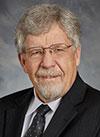Question
I am thinking about closing my office and sharing office space with another attorney. Are there special concerns about sharing an office?
Answer
Many lawyers are reconfiguring their law practices and thinking about spending more time working from home and not in the office. The Committee on Professional Ethics issued an extensive opinion regarding the ethics of working from home. See EF 21-02: Working Remotely, wisbar.org/ethop. Lawyers must keep in mind several ethics issues when working from home, particularly how to handle confidential information received from clients while in the home office setting.
 Dean R. Dietrich, Marquette 1977, is the president-elect of the State Bar of Wisconsin. He is with the law firm of Weld Riley S.C., Wausau, and is past chair of the State Bar Professional Ethics Committee.
Dean R. Dietrich, Marquette 1977, is the president-elect of the State Bar of Wisconsin. He is with the law firm of Weld Riley S.C., Wausau, and is past chair of the State Bar Professional Ethics Committee.
The plan to share an office with another lawyer also requires consideration of various ethics issues. See Formal Opinion E-00-02: Sharing Office Space with Unrelated Entities. The two most important considerations are confidentiality of client information and using the same office staff. Everything relating to the representation of a client is considered confidential and protected under the requirements of SCR 20:1.6 of the Rules of Professional Conduct. Lawyers who are sharing an office must make certain that they are not allowing each other access to client information and are storing client files in separate locations.
It would be best to have separate reception areas, although it is sometimes hard to have sufficient space for this in an office-sharing arrangement. It also would be best to have separate designated areas where clients will wait before meeting with a lawyer, such as several conference rooms where clients can go after checking in. Lawyers also must ensure that the physical layout and the signage used in an office-sharing arrangement do not convey any impression that the lawyers are operating as a single law firm.
The sharing of office staff also presents special considerations. Each lawyer has a duty under SCR 20:5.3 to properly supervise staff members and ensure that staff members fully comply with the Rules of Professional Conduct just as the lawyer is required to do. This likely would mean providing special training for staff members regarding client confidentiality and developing specific policies for shared employees’ handling of client information.
One issue that might arise is whether attorneys in an office-sharing arrangement would be able to represent clients that are on the opposite sides of a legal matter. There is no requirement under the conflict-of-interest rules (SCR 20:1.7) for each lawyer to abstain from representing a client in a legal matter against a client of the other attorney if the lawyer can clearly conclude that the representation will not be adversely affected because the lawyer on the other side is in the office-sharing arrangement. But special arrangements would need to be made regarding the use of office staff in handling the paperwork for each of the lawyers involved in the competing representation. It might be best to avoid such a representation, although the representation could occur if proper safeguards are adopted.
Lawyers are thinking of different ways to address sharing office space and expenses. Lawyers must be very careful to ensure they are complying with all requirements of the supreme court rules in such arrangements.
» Cite this article: 96 Wis. Law. 31 (February 2023).
